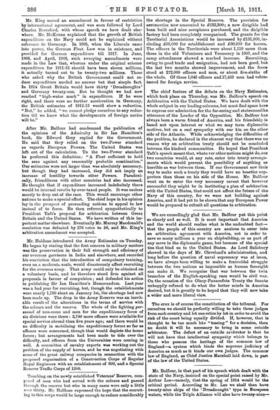After Mr. Balfour had condemned the publication of the opinions
of the Admiralty in Sir Ian Hamilton's book, Sir Edward Grey replied for the Government. He said that they relied on the two-Power standard as regards European Powers. The United States was left out of the calculation. To the two-Power standard he preferred this definition: " A Fleet sufficient to hold the seas against any reasonably probable combination." Our estimates were not larger than was absolutely necessary, but though they had increased, they did not imply an increase of hostility towards other Powers. Paradoxi- cally, friendliness with other countries had also increased. He thought that if expenditure increased indefinitely there would be internal revolts by over-taxed people. It was useless merely to drop out of the race. This would encourage other nations to make a special effort. The chief hope in his opinion lay in the prospect of persuading nations to appeal to law instead of to force. He then referred sympathetically to President Taft's proposal for arbitration between Great Britain and the United States. We have written of this im- portant matter elsewhere. Eventually Mr. Murray Macdonald's resolution was defeated by 276 votes to 56, and Mr. King's arbitration amendment was accepted.










































 Previous page
Previous page